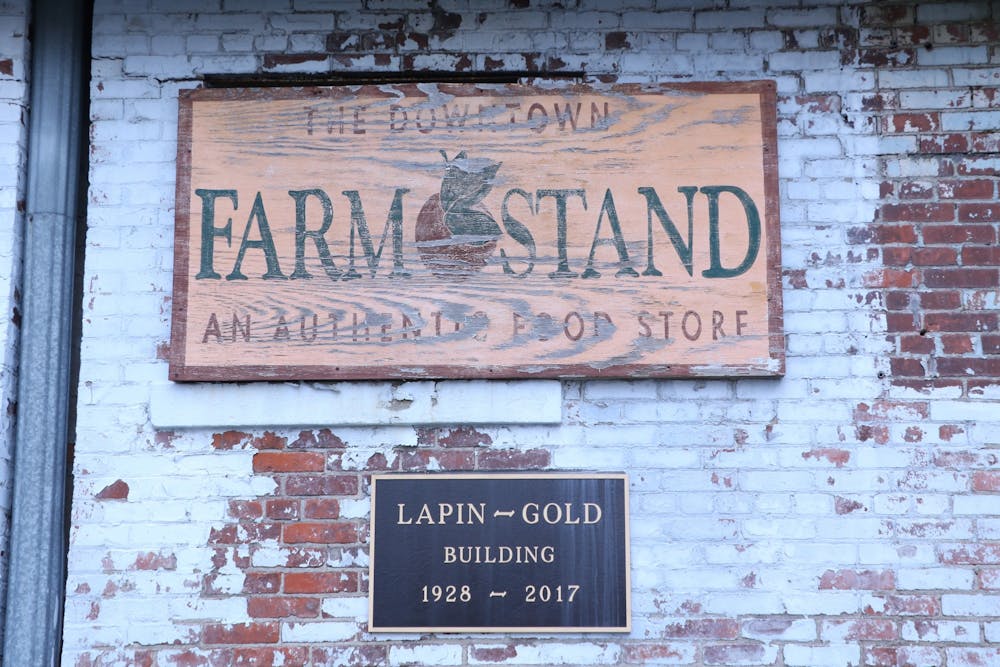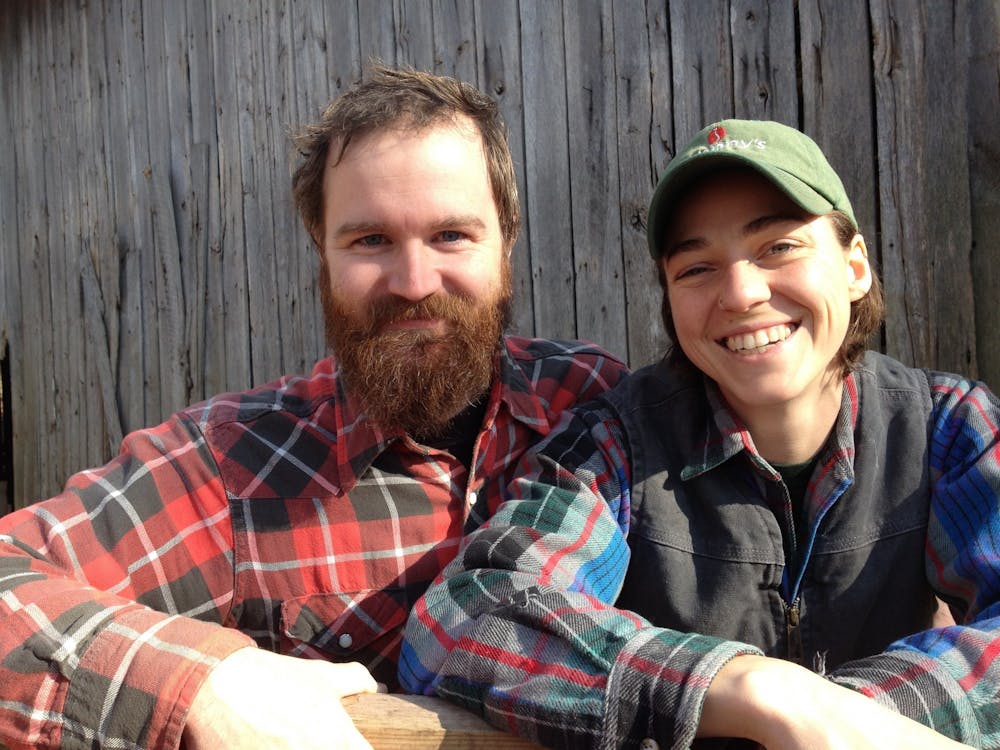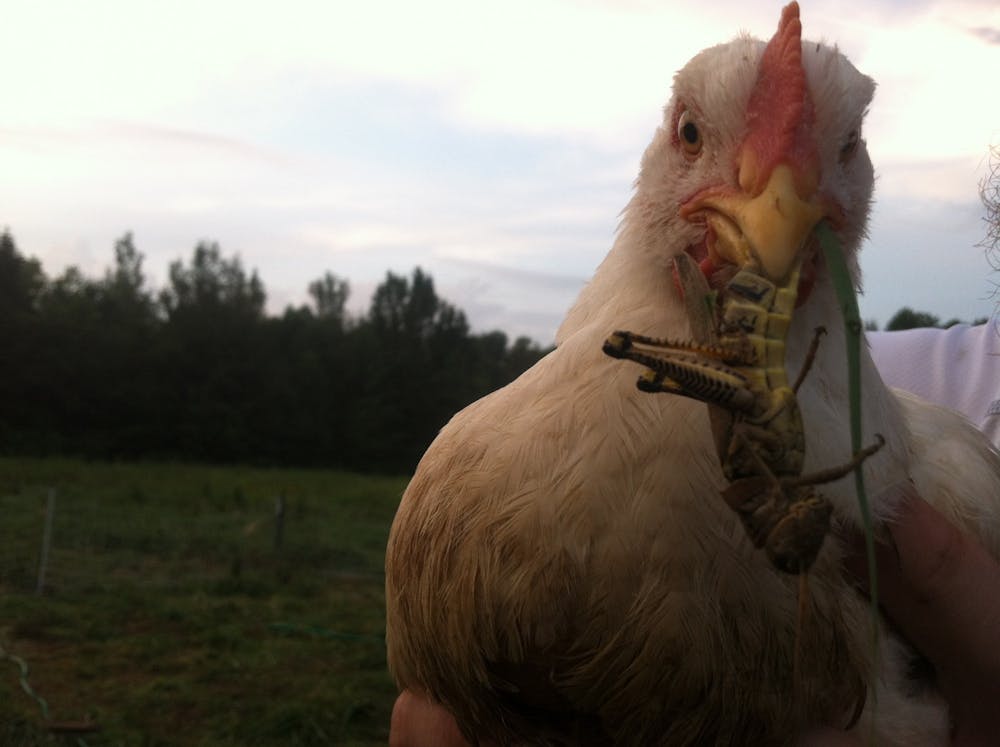When Dave Ring was a kid in the 1980s, he hated apples.
“They’re called Red Delicious, [which] is the type of apple, and they were coated in wax, and they were mealy, and they were disgusting,” he said.
In the ‘80s, Ring said food was mostly industrialized, and food producers strived to make a consistent product in high quantities. When he tried an organically produced apple — one produced solely with natural substances and processes, according to usda.gov — the difference was night and day, he said.
“I never knew that they could taste crisp, juicy, sweet — all these different flavors, different varieties of apples, not just Washington Delicious,” Ring said.
The distinction between organically produced food and commercially produced food would become the inspiration and mission of the Downtown Farm Stand, a downtown Muncie grocery store Ring and his wife, Sara Ring, opened in May 2007.
Located at 125 E. Main St., the Downtown Farm Stand offers a wide range of organically and sustainably produced goods, including food, toiletries, candies and even cider and beer. The Rings have run and developed the store for nearly 15 years, but they originally aspired to be farmers, Sara said.
After moving to Muncie from California, they bought their farm on Eaton-Albany Pike in August 1999 and planted sunflowers in the fields for their wedding, which they also held on their farm. Dave and Sara planted their first crop the following spring, Sara said.
“We sold to restaurants here in Muncie, we sold to farmers markets here in Muncie, we sold to restaurants and farmers markets in Indianapolis — a little bit of everything,” Dave said.
Dave said he noticed most farmer’s markets would follow a business model of reselling goods bought from produce auctions — marketing outlets where farmers sell excess produce at wholesale prices — instead of directly from local farms.
“A lot of times, [resellers] will tell you that it’s just because they want to have a full selection of products all throughout the season," Dave said, "and that’s a reason, but it’s not a way to really grow a local farm economy.”
From 2004-06, Dave and Sara started their own farmer’s market on 400 S. Walnut St., next to the Canan Commons in downtown Muncie. Dave said choosing a downtown location was a "very deliberate choice."
“We want to give inner city neighborhoods access to fresh food,” Dave said. “There’s a perception that only wealthy people or more snobby people … eat organic food. It’s not true. Low-income people like to have access to clean food, too.”
In May 2007, the Rings moved to their current location at 125 E. Main St. and made their farm stand a brick-and-mortar business. They first tried simultaneously to run both the store and their farm on Eaton-Albany Pike, but the store wasn’t sustainable with limited hours, Dave said.

“We decided that — to make it work — we were going to have to go full-time, so then we did 10 [a.m] to 7 [p.m.] Monday through Saturday,” Dave said. “And that seemed to do a lot, just being available.”
Right away, their efforts were noticed and recognized by locals such as Janice Largent, regular customer of the Downtown Farm Stand. She has lived in Muncie since 2002 and read about the Downtown Farm Stand in the newspaper when they first opened in 2007.
“Having grown up on a farm, I cared about how the land’s taken care of,” Largent said. “I’m not a trained environmentalist … I just always care about the environment.”
When she first began buying groceries at the Rings’ store, they were still in the process of renovating the space and cleaning out the previous owner’s belongings. Even though they only had about one-fourth of the products they currently have available, Largent said she started buying from them because she trusted their groceries were organic and their animal products were humanely raised.
Dave said their commitment to the local farm economy is strong. Purchasing from local farms, like the Nightfall Farm in Crothersville, Indiana, helps the Rings stock their shelves while reducing their carbon footprint since their products aren’t shipped over long distances.
“My husband takes it as a point of pride that… we’re not a big corporation or conglomerate,” said Liz Brownlee, co-owner of Nightfall Farm and president of the Hoosier Young Farmers Coalition, which seeks to recruit and support beginning farmers in Indiana. “We are one farm and part of a community of lots of different farmers.”
Liz and her husband Nate Brownlee, attended Hanover College and studied biology and anthropology, respectively. However, they each got the idea of starting a farm from a philosophy of food class Nate took during his senior year.
For the class, Nate visited several small farms near Hanover, Indiana, and learned about their organic growing processes, Liz said. Inspired by this month-long intensive course, the Brownlees started working as apprentices on organic farms in Maine and Vermont for five years after college.
“I think for [Nate], it was like a light bulb went off, ” Liz said.
The Brownlees started their own farm in spring 2014 on Liz’s family’s land and currently raise chickens, turkeys, pigs and sheep for meat, as well as laying hens for eggs. They raise their animals on pasture, meaning they are free to roam outdoors and eat fresh grass and foliage, Liz said.
“The way you eat really impacts the natural word – we vote with our forks three times a day, right?” Liz said. “Do we want to be supporting farmers that are sequestering carbon and providing habitat[s] and keeping food local, or do we want to be supporting farms that ship food halfway around the world and grow things out of season … and treat animals abysmally?”
In addition to raising animals on pasture, the Brownlees also focus on farming procedures that isolate carbon in the ground and reduce their carbon footprint. These include silvopasture — integrating trees into the same land that animals graze on — and rotational grazing, where animals are shifted over time between several different spaces to graze on, allowing the foliage to grow back while the animals are away.
“I’m definitely a believer in large-scale change,” Liz said about tempering the effects of climate change. “We also need small change. When people buy good food at small groceries, as eaters, that’s their way of being part of the climate solution. And when farmers like us can choose to farm in a way that sequesters carbon, that’s our act.”
The Brownlees met Dave and Sara Ring when the Rings’ usual source of chicken stopped raising chickens and focused his efforts on raising other animals, Liz said. The Rings posted a message on Facebook asking about local farmers with pasture-raised chicken, and the Hoosier Young Farmers Coalition told them about the Nightfall Farm.

The Brownlees sell not only to local grocery stores like the Downtown Farm Stand but also directly to individual customers through their Community-Supported Agriculture (CSA) program. In a CSA, individuals buy a whole share at once of a certain farm’s product for a defined period of time — in the case of Nightfall Farm, six months. This not only funds the farm with up-front payments but also guarantees there will be a product for customers to buy when they need it.
“It’s very much based on a relationship, so we get to know the CSA members,” Liz said. “We see them every month for pickup at the farmers market. We give them updates about the farm, and they get really good food.”
Between the support from local grocery stores and the Nightfall Farm CSA, Liz said she and Nate can steadily expand their farming operation and sustain their specific methods.
“Grocery stores like the Downtown Farm Stand and people like Dave and Sara mean that we can go into the future with some confidence and security,” Liz said.
Dave and Sara Ring have been steadily developing the Downtown Farm Stand since opening in 2007 with their rented space. They opened a deli in September 2009 selling food made with organic ingredients and started a grocery delivery service in November 2011 spanning several towns in northeastern Indiana. In December 2019, they purchased the rest of the building their store is based out of, restoring the second floor so it can be rented out for events.
The Rings plan to expand their business further in the vein of food service, Dave said, including a bar and restaurant, Second Story, based on the second floor. They believe it will open this summer.
Dave also said the name “Second Story” has a double meaning.
“Not only is it on the second story of our building,” he said, “but it’s also the beginning of the next chapter of the Downtown Farm Stand.”
Contact Miguel Naranjo with comments at miguel.naranjo@bsu.edu.





